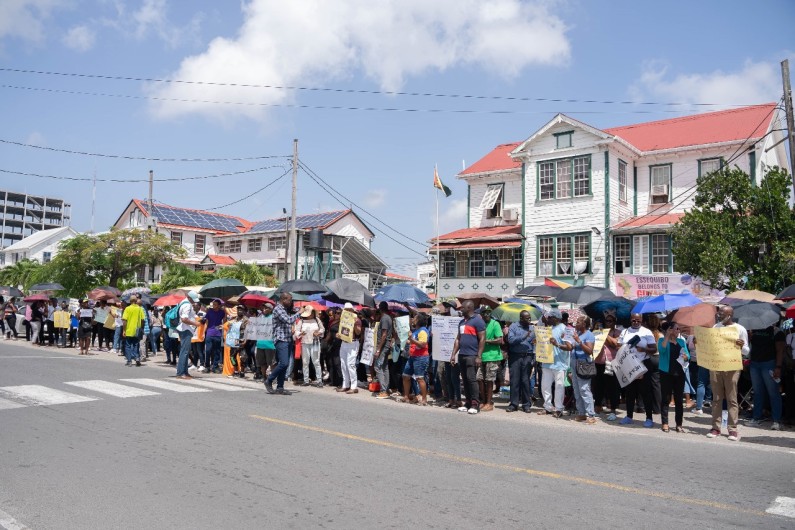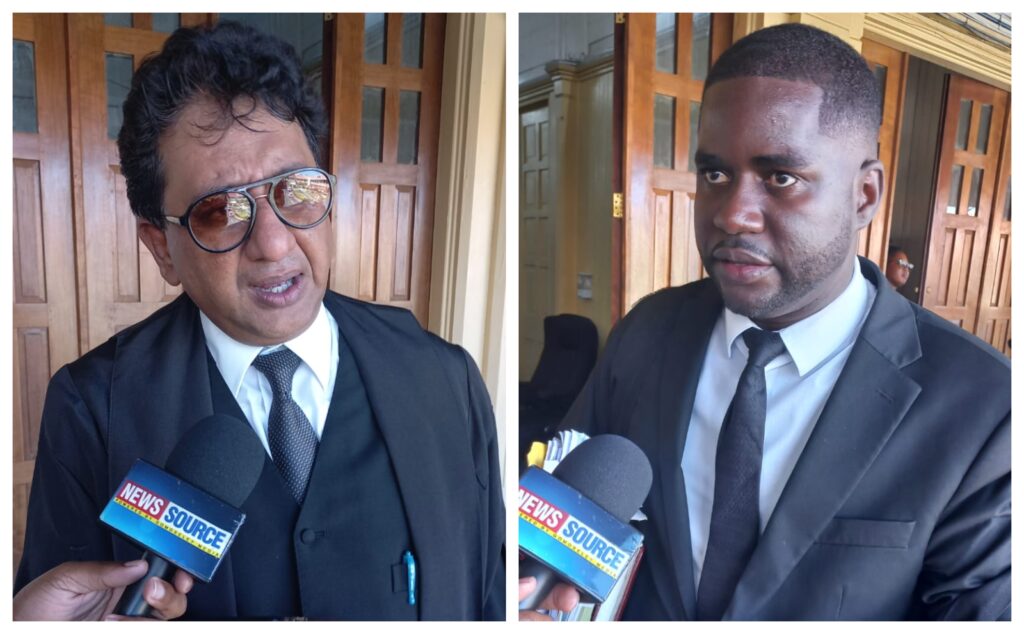
By Svetlana Marshall
In what could be seen as a major win for the Guyana Teachers’ Union (GTU), the High Court this afternoon granted two Conservatory Orders restraining the Government from cutting the salaries of striking teachers, and also blocking the Administration from moving ahead with a decision to discontinue the deduction of union dues from the salaries of teachers on behalf of the Union.
The orders were handed down by Justice Sandil Kissoon, and are to remain in place until the determination of the substantive matter before the Court, which was filed by the GTU.
Justice Kissoon granted the Conservatory Orders in response to an oral application by GTU’s Attorney, Daren Wade, for the “status quo” to be maintained pending the hearing and determination of the substantive case brought by the Union, challenging the actions of the Government.
Wade told the Court that the fundamental rights of teachers, including the right to property, and the right to engage in peaceful protest action, were at stake given the decision of the Government to deduct their salaries for engaging in industrial actions.
Further, he argued that the decision by the Government to discontinue the deduction of union dues on behalf of the union as a result of the strike, was a clear case of discrimination.
But the Attorney General, Anil Nandlall objected to the application sought by Wade, telling the Judge that the application lacked merit, and should be thrown out.
Citing several cases, the Attorney General argued that while Guyanese have the freedom to strike under the Constitution of Guyana, they do not have the right to strike.
He said freedom provides that option, and once the option is taken to engage in strike action, there are likely to be consequences, including the deduction of wages for work not done.
The Attorney General submitted that “no work” equates to “no pay,” and applies to the terms of employment for employees.
But even as the Attorney General sought to convince the Court that the Orders should not be granted, Justice Kissoon interjected, telling the Attorney General that at the time the Court was dealing strictly with the Conservatory Orders, and not the substantive matter.
Throughout the hearing, the High Court Judge repeatedly sought a commitment from the Government, through the Attorney General, that the status quo would be maintained pending the conclusion of the substantive matter.
The judge in seeking that commitment, proposed that the hearing of the substantive matter be brought forward.
But the Attorney General told the Court that he could not provide such an undertaking since he had not been given any such instruction from the Government.
It was then that the Judge indicated that in the absence of such a commitment, he would have to persevere the status quo by granting the Conservatory Orders in favour of the GTU.
Outside of the Courtroom, the Attorney General maintained his position that the case before the court has no merit.
“I spent a long time demonstrating to the judge that the case that is before the Court has no merit. That the two conservatory orders that are being sought are going to fail, they cannot be granted in the final analysis and if they cannot be granted in the final analysis as the law does not support their application, then how could they be granted as an interim measure? The judge felt that he wanted to keep the status quo present until the case is concluded, and he felt compelled to grant the orders,” the Attorney General said.
Further, he said if teachers have withheld their services by striking, the Government should not be made to pay them for work not done.
“The law allows the government, in case the employer, to deduct pay when labour is not produced in a contract. You see, it is labour for money. If you withhold your labour, I must be allowed to withhold my pay. And I believe a conservatory order in that instance, which compels the government to pay when the teachers are not providing their labour, is wrong,” the Attorney General said.
Asked why he was reluctant to offer a commitment to maintain the status quo, the Attorney General in response said there was no commitment from the Union to end the strike.
“I also asked for an undertaking, the Judge wants an undertaking to stop the deduction from taking place, and I said I have no problem with that, if the teachers would go back to their work,” he said.

However, Justice Kissoon, in granting the orders said the Court would be relegating from its duty if it did not grant the orders in the absence of an undertaking from the Government, as he too cited a number of cases in favor of his decision.
Wade praised the decision of the Court, telling reporters that it was important to safeguard the fundamental rights of teachers .
“Our contention is the right to property, the right to your salary is your right to property, and we believe that that right be infringed,” Wade said as he refuted contentions by the Attorney General that the case lacks merit.
Meanwhile, GTU President Mark Lyte, who sat through the Court hearing today, said he was satisfied with the Conservatory Orders granted.
“We are satisfied with the first ruling of the judge, simply because that is why we brought the matter to court because we do not believe government acted in fairness to the teachers of Guyana, the act was vexatious in terms of not deducting dues and we have also learnt that they have given instructions to deduct salaries. We felt that this was not the right move by Government and steps should have been taken to try and resolve the problem,” Mark said.
Initially, the case was scheduled to be heard on April 4, however, the Judge has set March 20 as the new date for the hearing, to allow for an early conclusion.











You must be logged in to post a comment Login